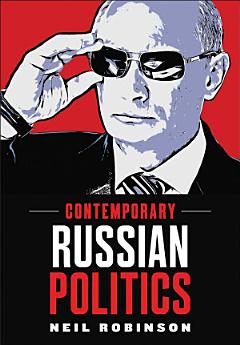Contemporary Russian Politics: An Introduction
เม.ย. 2019 · John Wiley & Sons
eBook
304
หน้า
reportคะแนนและรีวิวไม่ได้รับการตรวจสอบยืนยัน ดูข้อมูลเพิ่มเติม
เกี่ยวกับ eBook เล่มนี้
Vladimir Putin’s return to the Kremlin for a fourth presidential term in 2018 has seen Russian democracy weaken further and Russia’s relations with the West deteriorate seriously. Yet, within Russia, Putin’s position remains unchallenged and his foreign policy battles have received widespread public support. But is Putin as safe as his approval ratings lead us to believe? And how secure is the regime that he heads? In this new book, Neil Robinson places contemporary Russian politics in historical perspective to argue that Putin’s regime has not overcome the problems that underpinned the momentous changes in twentieth-century Russian history when the country veered from tsarism to Soviet rule to post-communist chaos.
The first part of the book, outlining why crises have been perennial problems for Russia, is followed by an exploration of contemporary Russian political institutions and policy to show how Putin has stabilised Russian politics. But, while Putin’s achievements as a politician have been considerable in strengthening his personal position, they have not dealt successfully with the enduring problem of the Russian state’s functionality. Like other Russian rulers, Putin has been much better at establishing a political system that supports his rule than he has at building up a state that can deliver material wealth and protection to the Russian people. As a result, Robinson argues, Russia has been and remains vulnerable to political crisis and regime change.
The first part of the book, outlining why crises have been perennial problems for Russia, is followed by an exploration of contemporary Russian political institutions and policy to show how Putin has stabilised Russian politics. But, while Putin’s achievements as a politician have been considerable in strengthening his personal position, they have not dealt successfully with the enduring problem of the Russian state’s functionality. Like other Russian rulers, Putin has been much better at establishing a political system that supports his rule than he has at building up a state that can deliver material wealth and protection to the Russian people. As a result, Robinson argues, Russia has been and remains vulnerable to political crisis and regime change.
เกี่ยวกับผู้แต่ง
Neil Robinson is Professor of Comparative Politics at the University of Limerick.
ให้คะแนน eBook นี้
แสดงความเห็นของคุณให้เรารับรู้
ข้อมูลในการอ่าน
สมาร์ทโฟนและแท็บเล็ต
ติดตั้งแอป Google Play Books สำหรับ Android และ iPad/iPhone แอปจะซิงค์โดยอัตโนมัติกับบัญชีของคุณ และช่วยให้คุณอ่านแบบออนไลน์หรือออฟไลน์ได้ทุกที่
แล็ปท็อปและคอมพิวเตอร์
คุณฟังหนังสือเสียงที่ซื้อจาก Google Play โดยใช้เว็บเบราว์เซอร์ในคอมพิวเตอร์ได้
eReader และอุปกรณ์อื่นๆ
หากต้องการอ่านบนอุปกรณ์ e-ink เช่น Kobo eReader คุณจะต้องดาวน์โหลดและโอนไฟล์ไปยังอุปกรณ์ของคุณ โปรดทำตามวิธีการอย่างละเอียดในศูนย์ช่วยเหลือเพื่อโอนไฟล์ไปยัง eReader ที่รองรับ






